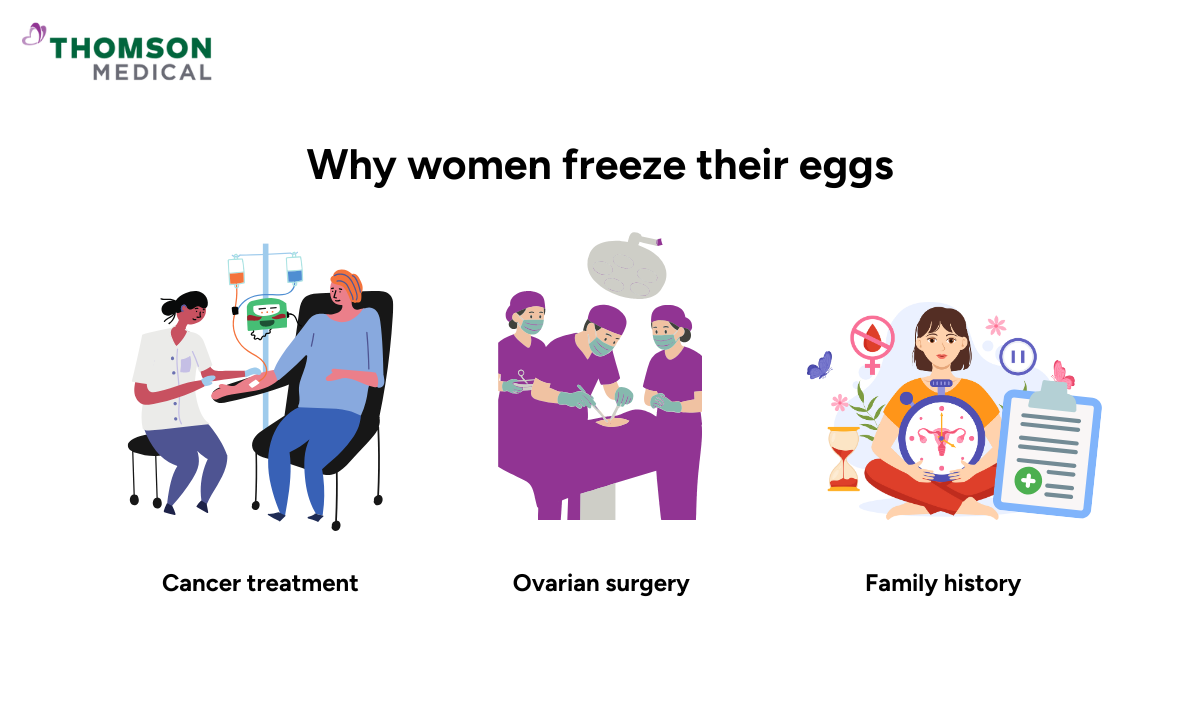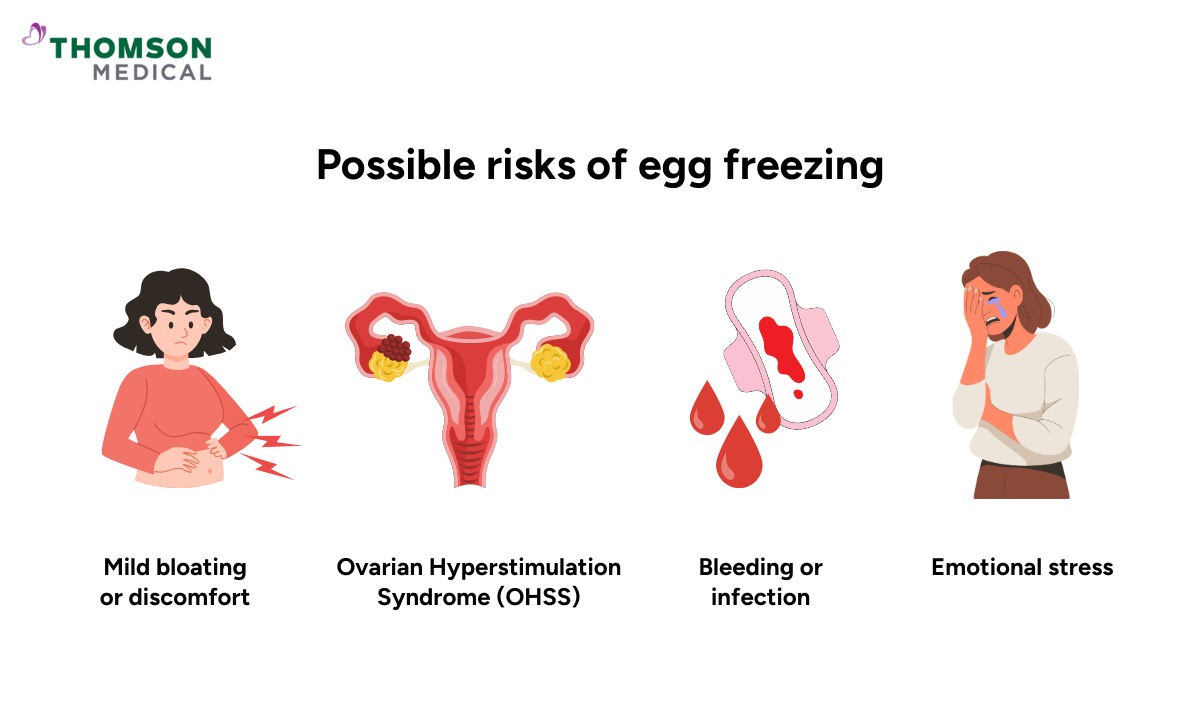Have you ever felt the weight of watching time slip by? Maybe you're building something meaningful in your career, or you're still searching for the right relationship. Perhaps you're facing a health challenge that's thrown your future plans into question. What if I'm not ready now, but I want children someday?
Whatever your situation, you're not alone in feeling this. There's a quiet worry many women share but don't always talk about. The good news is you have options. Elective egg freezing has helped thousands of women take back some control over their timeline. It won't solve everything, but it can ease that pressure and give you breathing room to make decisions on your own terms.
What is egg freezing?
Egg freezing, or medically called mature oocyte cryopreservation (oocyte means egg, cryopreservation means freezing for long-term storage), is a way to preserve your fertility for future.
Your doctor collects mature eggs from your ovaries through a short medical procedure. Those eggs are then frozen at extremely low temperatures and stored safely in a fertility clinic. They can stay frozen for years without losing their potential for fertilisation.
When you're ready to try for a baby, the eggs are carefully thawed. They're fertilised with sperm in a lab through a process called In vitro Fertilisation (IVF), which means fertilisation happens in a controlled environment outside your body. The resulting embryo (early-stage fertilised egg) is then transferred into your uterus, where it can develop into a pregnancy.
Why do women freeze their eggs?

Every woman’s life path is different — and so is the right time to plan for her future family. Whether for health, career, or personal reasons, egg freezing helps you take control of your future fertility, on your own timeline.
Medical reasons
Some women face health situations that put their fertility at risk:
Cancer treatment:
Chemotherapy and radiation can damage your ovaries and reduce your ovarian reserve. Freezing eggs before cancer treatment gives you a chance to preserve your fertility.
Ovarian surgery:
If you need surgery that might affect your ovaries, freezing eggs beforehand helps preserve your ability to have children later.
Family history:
If early menopause (when periods stop before age 40) runs in your family, or you have conditions that affect egg reserve, freezing eggs sooner rather than later makes sense.
Personal reasons
Your fertility drops naturally with age, especially after 35. Both the number and quality of eggs decline sharply around this point. Freezing eggs earlier keeps the door open for a healthy pregnancy later, even if you wait years to conceive. Many women choose it because they:
Are focused on your career or education right now
Haven't met the right partner yet
Want to feel financially stable first
Are simply not emotionally ready to start a family
Want the freedom to decide when the timing feels right for you
Whatever brings you here, egg freezing gives you room to make choices without feeling rushed by biology. Always discuss with your fertility doctor to understand what’s best for your situation.
Our fertility specialists
Loading...
When is the right time to freeze my eggs?
Timing matters a lot here. Doctors recommend freezing eggs in your late 20s to early 30s when your eggs are healthiest and most plentiful.
After 35, egg quality and quantity naturally decline. It’s still possible to freeze eggs, but you may need more than one cycle to collect the 20–30 eggs that typically give strong chances of a future pregnancy.
If you're preparing for medical treatments that could affect fertility, such as chemotherapy or ovarian surgery, it will be good to act as soon as possible. The earlier you freeze, the better your results are likely to be.
If you're thinking about preserving your fertility, it's best to discuss your options early. Request an appointment with Thomson Medical to find out the ideal time for egg freezing based on your age, ovarian reserve, and future family plans. Our fertility specialists can guide you through every step with personalised advice.
How does egg freezing work?
The whole process takes around two to three weeks per cycle. Here's what happens:
Ovarian stimulation:
You'll get hormonal injections daily for about 10 to 12 days. These push your ovaries to produce several eggs instead of the usual one.
Monitoring progress:
Your clinic tracks how you're responding through blood tests and ultrasound scans. They watch for the right moment to collect your eggs.
Oocyte retrieval (egg retrieval):
When your eggs are ready, your doctor uses a thin needle guided by ultrasound to collect them in the operating theatre. You'll be sedated, so you won't feel anything. The whole thing usually takes less than 30 minutes.
Freezing (vitrification):
Your mature eggs get rapidly frozen using a technique called vitrification (ultra-fast freezing that stops ice crystals from forming). They're stored in liquid nitrogen at –196°C, where they stay safe for years. Your eggs sit there, unchanged, until you decide to use them.
What are the possible risks of egg freezing?

Egg freezing is safe and well-tested, but no medical procedure comes without some risk.
Some women get Ovarian Hyperstimulation Syndrome (OHSS), where the ovaries react too strongly to the medication. You might feel bloated or uncomfortable. Severe cases are rare, and clinics watch closely for signs.
The egg retrieval itself carries tiny risks of bleeding or infection. Clinics take careful steps to prevent these.
Beyond the physical side effects, the process can be emotionally intense. Hormone shifts, daily injections, and waiting for results can feel overwhelming. Having support is important, whether from a partner, friends, family, or your care team.
What is the success rate?
Age is everything when it comes to success. Younger eggs have better odds of leading to a healthy pregnancy.
Before we look at success rates, here is a breakdown of how many eggs typically make it through each step.:
80 to 90% of frozen eggs survive the thawing process (using modern vitrification)
70 to 80% of thawed eggs successfully fertilise with sperm
About 40% of fertilised eggs develop into good-quality embryos suitable for transfer
Each embryo transfer has a 35 to 45% chance of resulting in pregnancy (depending on age at freezing)
This might sound like a lot of steps, but here's the important part: the more eggs you freeze, the better your overall chances.
Success rates by age and number of eggs frozen
Your age when you freeze eggs and how many you freeze both matter. Here's what the data shows:
Age at freezing | Number of eggs needed | Chance of having at least one child |
Under 35 | 10 eggs | ~30% |
Under 35 | 15 eggs | ~70% |
Under 35 | 20 eggs | 80-85% |
35-37 | 20 eggs | 60-70% |
38-40 | 30 eggs | ~75% |
41-42 | 30 eggs | ~50% |
If you’re planning to freeze your eggs, understanding success rates can help set realistic expectations. Request an appointment with Thomson Medical to discuss your fertility goals and learn how factors like age, egg quality, and quantity may affect your chances of a successful pregnancy in the future.
FAQ
Is egg freezing legal in Singapore?
Yes. Since July 2023, elective egg freezing has been legal for women aged 21 to 37. Before that, it was only allowed for medical reasons.
Is 37 too late to freeze eggs?
It’s not too late. Success rates do decline with age, but it's still possible. You might need more cycles to collect enough good-quality eggs.
What age is best for egg freezing?
The best age for egg freezing is between 28 and 34 years old. Freezing your eggs during this window helps you preserve the highest-quality eggs when your ovarian reserve is still strong.
How long can eggs stay frozen?
You can securely store eggs that have been vitrified for many years, maybe even forever, until you're ready to use them. If you decide that you won’t use your frozen eggs, you can either give them to another couple, donate them for research, or discard them.
Will I still get my period after freezing my eggs?
Yes, your cycle returns once you stop the hormone medications. Egg freezing doesn't change your normal periods.
Is oocyte retrieval painful?
No, egg retrieval is not painful, as you're sedated during the procedure. You might feel mild cramps or bloating afterwards, but this fades within a few days.
Do we get periods after freezing eggs?
No, egg freezing doesn’t stop your periods for good. Your menstrual cycle will return after the egg retrieval, though the first period might be slightly different from your usual one.
The information provided is intended for general guidance only and should not be considered medical advice. For personalised recommendations and tailored advice based on your unique situations, please consult a specialist at Thomson Medical. Request an appointment with Thomson Medical today.
